Group Portrait with a Lady is a french film of genre Drama directed by Aleksandar Petrović with Romy Schneider
Group Portrait with a Lady (1977)
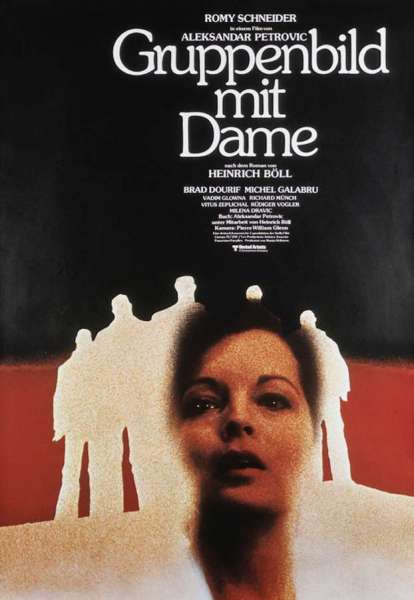
If you like this film, let us know!
Group Portrait with a Lady (German: Gruppenbild mit Dame) is a 1977 German-French drama film directed by Aleksandar Petrović. It was entered into the 1977 Cannes Film Festival. It is based on the novel of the same name.
Synopsis
De 1936 à 1966, trente ans de la vie tumultueuse de Léni Gruyten née en 1922, à travers l'Allemagne nazie et la Seconde Guerre mondiale.Actors

Romy Schneider
(Leni Gruyten)

Brad Dourif
(Boris Koltowski)

Michel Galabru
(Walter Pelzer)

Vadim Glowna
(Erhard Schweigert)

Richard Münch
(Hubert Gruyten)
Comments
Leave comment :
Suggestions of similar film to Group Portrait with a Lady
There are 284 films with the same actors, 8 films with the same director, 69143 with the same cinematographic genres (including 746 with exactly the same 3 genres than Group Portrait with a Lady), 7796 films with the same themes, to have finally 70 suggestions of similar films.If you liked Group Portrait with a Lady, you will probably like those similar films :

Three (1965)
, 1h20Directed by Aleksandar Petrović
Genres Drama, War
Themes Politique, Political films
Actors Bata Živojinović, Stole Aranđelović, Kole Angelovski, Dragomir Bojanić, Milivoje Tomić
Rating77%





Drame épisodique de la Seconde Guerre mondiale qui suit un Yougoslave à travers la guerre alors qu'il passe de témoin à victime puis agresseur.
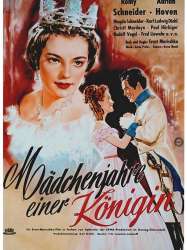
The Story of Vickie (1954)
, 1h58Directed by Ernst Marischka
Origin Austria
Genres Drama, Comedy, Romantic comedy, Historical, Romance
Themes Political films, Films about royalty
Actors Romy Schneider, Adrian Hoven, Magda Schneider, Peter Weck, Karl Ludwig Diehl, Christl Mardayn
Rating64%





After her Prime Minister Lord Melbourne arranges a marriage for her with the German Prince Albert, the young Queen Victoria decides to leave London and spend some time in Kent. While there she meets a handsome young German and falls in love, unaware that he is her intended husband Albert.
 , 1h46
, 1h46Directed by Ernst Marischka
Origin Austria
Genres Drama, Comedy-drama, Historical, Romance
Themes Political films, Films about royalty
Actors Romy Schneider, Karlheinz Böhm, Magda Schneider, Gustav Knuth, Josef Meinrad, Uta Franz
Rating66%





The Austrian empress Elisabeth, nicknamed Sissi, enjoys travelling in Hungary. She welcomes the politically valuable friendship of Count Andrássy, but when he confesses he is in love with her, she returns to Vienna lest the relationship become too intimate. Her time in Hungary is only a temporary relief from the frustrations of court life in Vienna, where dutiful Franz Josef remains at his desk and allows his strict, domineering mother Sophie to interfere in the raising of his daughter with Sissi, Sophie. Sissi decides to return and meets Franz underway who was coming to Hungary to bring her back to Vienna. They decide to take a vacation in Bad Ischl but Sissi falls ill and is diagnosed with possibly fatal tuberculosis. On doctors' orders Franz Josef must allow his mother to remove his daughter from Sissi's keeping. In poor health, deprived of the company of husband and child, Sissi is in danger of losing the will to live as she travels to healthier climates on Madeira and Corfu. Desperately needed psychosomatic therapy appears in the form of her indestructibly positive mother Ludovika, who lovingly nurses Sissi's illness and restores her zest for life by taking her on idyllic walks. Once again Oberst Böckl, the clumsy body-guard whose doting admiration for the empress borders on the improper, provides a comical note, as he does in each part of the trilogy. Finally, Sissi recovers and rejoins her husband on an official visit to Milan and Venice, Austria's remaining possessions in northern Italy. Nationalists have prepared a hostile welcome for the Habsburg sovereigns; the Milanese nobility send their servants, dressed in noble clothing, to a royal command performance at La Scala, at which the orchestra play Verdi's chorus "Va pensiero," and the disguised servants in the audience sing it in protest against Austrian rule. There is a moment of comic relief when, after the opera, Franz Josef and Sissi receive the disguised servants at a formal reception, where the servants are presented to the imperial couple under the names of their aristocratic masters and mistresses. Sissi is aware that she is not meeting the true nobility, but when the real nobles realize their servants were introduced to the emperor and empress, they shriek in despair and panic at the idea that the imperial couple believe the awkward, common servants were really the aristocrats. In Venice, crowds stand in hostile silence at the couple's procession by royal barge on the Grand Canal and as they pass, Italian nationalist flags are defiantly unfurled from behind shuttered windows. But the emotional Italians melt when they witness the openly loving reunion between Sissi and her little daughter on St Mark's Square.

The Last Train (1973)
, 1h35Directed by Pierre Granier-Deferre
Origin France
Genres Drama, War, Historical, Romance
Themes Transport films, Rail transport films, Political films, Histoire de France, L'Occupation allemande en France, La condition juive en France sous l'Occupation allemande, Film se déroulant dans un train
Actors Jean-Louis Trintignant, Romy Schneider, Maurice Biraud, Régine, Nike Arrighi, Serge Marquand
Rating68%





In May 1940 a packed train takes refugees from a French village near the Belgian border away from the advancing German forces.. On it are Julien, a short-sighted radio repairer, and his pregnant wife and daughter. The women are given priority in a carriage at the front while he has to scramble into a cattle truck at the rear. There he is struck by a mysterious and beautiful young woman on her own.

Famous Love Affairs (1961)
, 2h10Directed by Michel Boisrond
Genres Comedy-drama, Historical, Romance
Themes Politique, Political films, Films about royalty
Actors Jean-Paul Belmondo, Philippe Noiret, Dany Robin, Michel Galabru, Guy Tréjan, Agnès Laurent
Rating53%





Plusieurs histoires d'amour qui ont pour protagonistes des personnages de l'Histoire. Film à sketches.
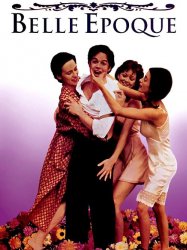
Belle Époque (1992)
, 1h48Directed by Fernando Trueba
Origin Espagne
Genres Drama, Comedy, Comedy-drama, Romance
Themes Political films
Actors Jorge Sanz, Penélope Cruz, Fernando Fernán Gómez, Michel Galabru, Ariadna Gil, Miriam Díaz-Aroca
Rating70%





The year is 1931. Spain is politically divided between Republicans and Traditionalists and on the verge of the Spanish Second Republic. Fernando, a young soldier, deserts. He befriends Manolo (Fernando Fernán Gómez), an old man with a large house in the country. Fernando meets and is enchanted by Manolo's four daughters. As he meets each of the first three one by one, he falls in love and has sex with each of them, determining to marry but with each one a complication arises: Clara (Miriam Díaz-Aroca), a widow who only recently lost her husband and who seeks solace with Fernando; Violeta (Ariadna Gil), a lesbian who is only attracted to Fernando when he is dressed as a woman for a costume ball and Rocío (Maribel Verdú), a social climber who is about to marry into a royalist family for the security it would provide and who only momentarily succumbs to Fernando's charms. Heartbroken each time, the father of the girls encourages him to have patience. Each of the daughters is beautiful and represents a different aspect of feminine sexuality. The youngest of the family, Luz (Penélope Cruz), represents naïveté. While Fernando is pursuing her sisters, Luz gets progressively angry and jealous but eventually Fernando realizes that she is the best one of the four to marry.

A Year of the Quiet Sun (1984)
, 1h50Directed by Krzysztof Zanussi
Origin Pologne
Genres Drama, War, Romance
Themes Political films
Actors Maja Komorowska, Scott Wilson, Vadim Glowna, Ewa Dałkowska, Danny Webb, Zbigniew Zapasiewicz
Rating70%





Ouest de la Pologne, 1946. Emilia et sa mère invalide tentent de survivre dans une terre dévastée, autrefois allemande avant d'être intégrée à la Pologne. Emilia rencontre Norman, soldat américain, venu là pour enquêter sur des crimes de guerre. C'est bientôt l'amour, mais le temps est compté et Norman est rappelé à Berlin. Pour permettre à sa fille de suivre son amant, la vieille femme décide de se laisser mourir.
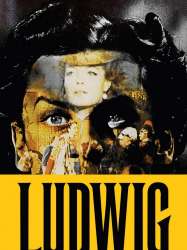
Ludwig (1973)
, 4h45Directed by Luchino Visconti
Origin Italie
Genres Drama, Biography, Historical
Themes Films about music and musicians, Politique, Films about sexuality, LGBT-related films, Films about classical music and musicians, Musical films, Political films, LGBT-related films, Films about royalty, LGBT-related film
Actors Helmut Berger, Trevor Howard, Silvana Mangano, Sonia Petrovna, Romy Schneider, Gert Fröbe
Rating74%





Évocation de la vie de Louis II de Bavière, depuis son couronnement à l'âge de dix-huit ans et demi jusqu'à son internement et sa mort à quarante. On y découvre la complicité presque amoureuse qui le lie à sa cousine Sissi (la jeune impératrice d'Autriche-Hongrie) qui est à deux doigts de parvenir à lui faire épouser sa sœur Sophie malgré le peu d'attirance qu'il a pour celle-ci, son entichement déraisonnable pour la musique de Richard Wagner, dont il devient le très généreux mécène au point de lui faire construire un opéra, les circonstances qui l'amènent à céder aux penchants qui lui seront funestes : son goût du rêve, du post-romantisme, des garçons (son palefrenier devenant son chambellan et homme de confiance très intime), des châteaux de contes de fées, pour l'édification desquels il dépense des fortunes et dans lesquels il fuira les dures réalités de son temps (à savoir : l'irrésistible unification allemande autour de la Prusse de Bismarck qui vassalise tous les autres royaumes ou principautés germaniques, Bavière y compris) en s'imaginant, entouré d'une garde rapprochée de serviteurs, qu'il est encore vrai roi en son royaume. Jusqu'à ce que le gouvernement effectif de Munich l'extirpe de son rêve et l'interne au château de Berg… où il meurt dès le lendemain de son arrivée en tentant, dans des circonstances jamais vraiment élucidées, de s'évader.

The Assassination of Trotsky (1972)
, 1h43Directed by Joseph Losey
Origin United-kingdom
Genres Drama, Thriller, Horror, Historical
Themes Assassinat, Politique, Political films
Actors Richard Burton, Alain Delon, Romy Schneider, Valentina Cortese, Jean Desailly, Enrico Maria Salerno
Rating56%





Exiled from the Soviet Union in 1929, Leon Trotsky travels from Turkey to France to Norway, before arriving in Mexico in January 1937. The film begins in Mexico City in 1940, during a May Day celebration. Trotsky has not escaped the attention of the Soviet ruler of the Soviet Union, Joseph Stalin, who sends out an assassin named Frank Jacson. The killer decides to infiltrate Trotsky's house by befriending one of the young communists in Trotsky's circle.
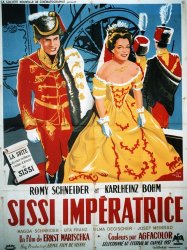
Sissi: The Young Empress (1956)
, 1h47Directed by Ernst Marischka
Origin Austria
Genres Drama, Comedy, Comedy-drama, Romance
Themes Political films, Films about royalty
Actors Romy Schneider, Karlheinz Böhm, Magda Schneider, Gustav Knuth, Josef Meinrad, Vilma Degischer
Rating66%





Sissi slowly adapts to life as empress of Austria, but her mother-in-law is hard to live with. Archduchess Sophie adheres to the long-established rules protocol and etiquette, and constantly interferes not only with the emperor's government of the empire but in his family life as well. When Sissi's first child is born, the Archduchess Sophie insists on taking away the child to raise her, because she feels Sissi is too young and unqualified to do so. Sophie also feels that Sissi's place is not in the nursery with her baby, but with her husband as the emperor travels around the empire. A scandal threatens to break out when Sissi leaves Vienna and returns to Bavaria to see her parents. She keeps the truth from her mother, but confesses to her father that she cannot live with Archduchess Sophie's constant criticism and tyranny. Franz Joseph follows her and finally convinces her to return to Vienna. This strengthens Sissi's influence with the emperor, and she supports Prince Gyula Andrássy and the cause of the Hungarians for equal standing in the Empire. The movie concludes with her being crowned Queen of the Hungarians in Budapest. (In fact the coronation was not held until 1867, but "Sissi--The Young Empress" brings the event forward in time to make the ceremony appear to be a confirmation of Sissi's improving status as empress.
 Connection
Connection